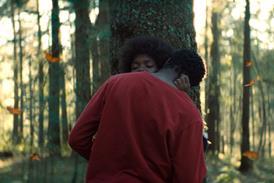Iranian auteurs have been collaborating with French producers since the 1990s: Abbas Kiarostami with CiBy 2000 on 1994's Through The Olive Trees, for example, and Mohsen Makhmalbaf with MK2 on Gabbeh in 1996.
Amir Esfandiari, head of international affairs for Farabi, notes that there has been a rise in co-productions over the past few years, especially with upcoming directors.
International producers familiar with Iranian cinema say there is untapped potential. "We would work with as many Iranian film-makers as possible, provided they have the same talent as their predecessors," says Bac president Jean Labadie, who co-produced Makhmalbaf's Kandahar.
Bahman Ghobadi's Half Moon is indicative of the direction co-productions could take. Commissioned by Peter Sellars' Vienna-based New Crowned Hope initiative, the film was co-produced by Simon Field and Keith Griffiths' Illuminations Films and France's Silkroad Production, with input from Kurdish Iraqi financiers. Post-production was done in Tehran. "The principle was to commission the films, stimulate them into existence and part-finance them, but allow the director freedom to develop the project," says Field.
Iranian Independents' Mohammad Attebai cites Iran's lack of formal co-production treaties as a "big barrier", and producers emphasise that most deals are for co-financing rather than co-production. Moreover, the investment is usually limited to post-production and distribution.
Censorship can be a turn-off for international investors, despite the low-risk budgets. "[Producers'] reluctance is due to there being no real guarantee that the film will get a release permit [in Iran]," says director Bahman Farmanara, who has just been granted a permit to shoot Discovering Your Country, a $389,000 feature about a Tehrani returning to his roots.
Still, says critic and Farabi research executive Kamyar Mohsenin, "Real co-production projects are beginning to happen, and there seems to be more mutual co-operation between partners within the region." Last year saw Iran's first co-production with Saudi-owned Arab Radio and Television (ART), Abolhasan Davoudi's The Incident. Further co-productions between Iran and Central Asian countries are in the pipeline.
Co-production deals with Japanese companies are also increasingly important. Key producer Ali Shoja Noori first collaborated with the Nikkatsu Corporation on Farda in 2002, going on to produce Kamal Tabrizi's The Wind Carpet with Three Arrows Entertainment, and Kiarostami's Five Dedicated To Ozu with NHK in 2003; Japan's public TV station now has several projects in development.
Farabi's Esfandiari confirmed that producers and buyers from Indonesia, Taiwan and Malaysia, as well as Japan and Korea, are attending this year's market at Fajr.
Meanwhile, there are signs other international producers are looking at Iran. Zentropa is reportedly developing a project with an Iranian film-maker, while Merchant Ivory is negotiating with Kambozia Partovi and Ghobadi to adapt Terence Ward's novel Searching For Hassan.
For foreign documentaries, "Iran is flavour of the month," says Coco Ferguson, who has a documentary on singer Javad in production. Producer Norma Percy is working on permits to shoot the Brook Lapping documentary series Iran And The West, a BBC, PBS and France 3 co-production. Revolution Films shot both In This World and The Road To Guantanamo in Iran. "Permits and visas took a long time but the Tehran facilities were good," says producer Melissa Parmenter. "The amazing scenery can double for so many other countries, as can the diverse people. I would certainly go back."





















No comments yet